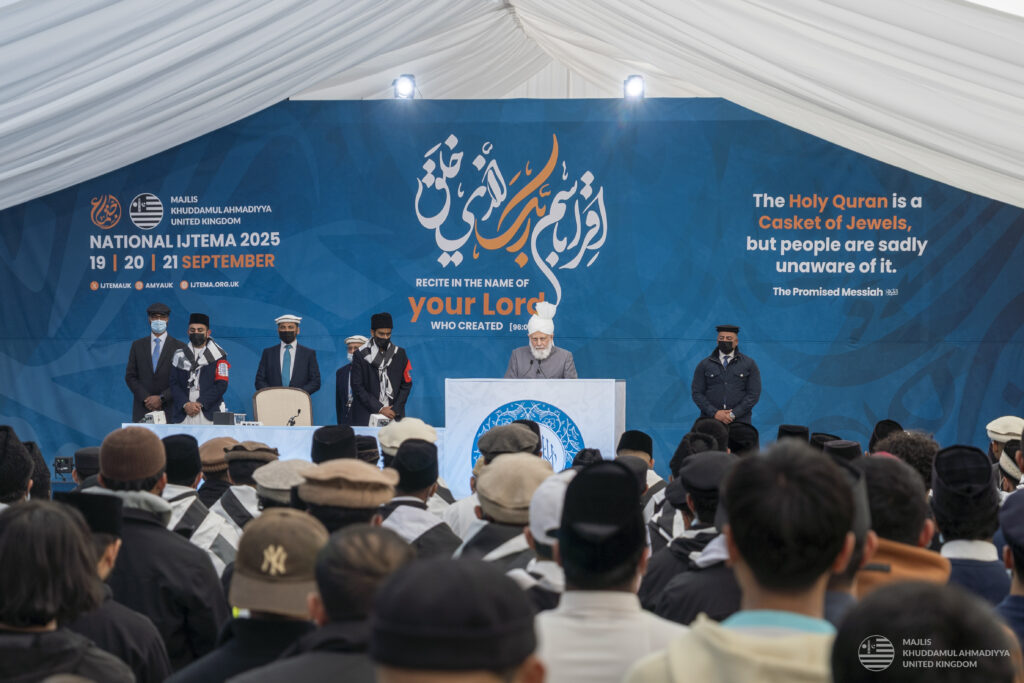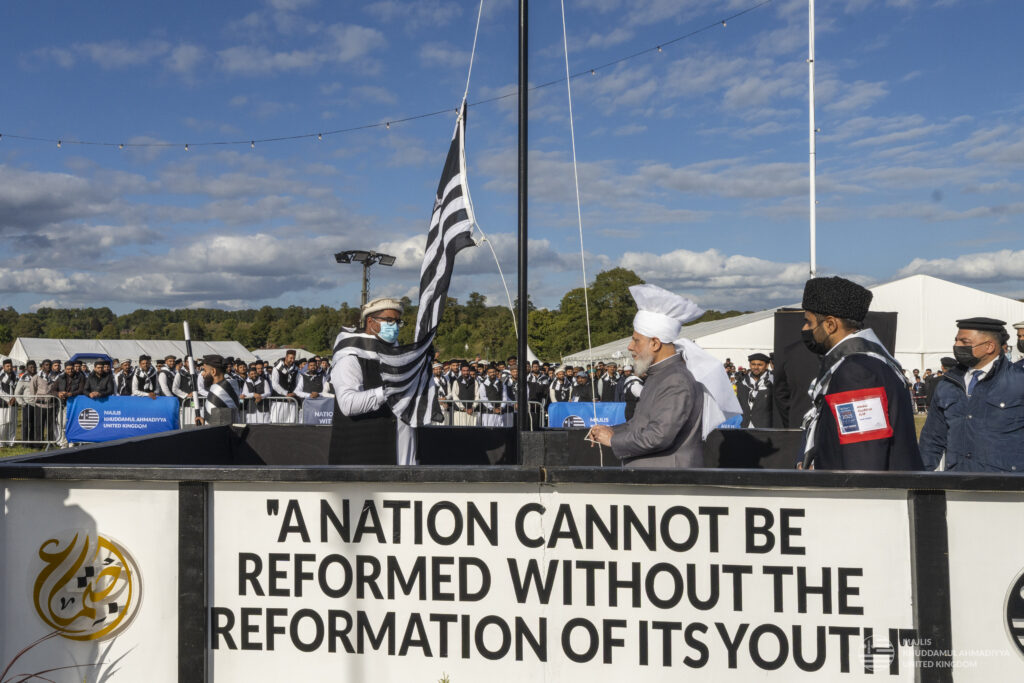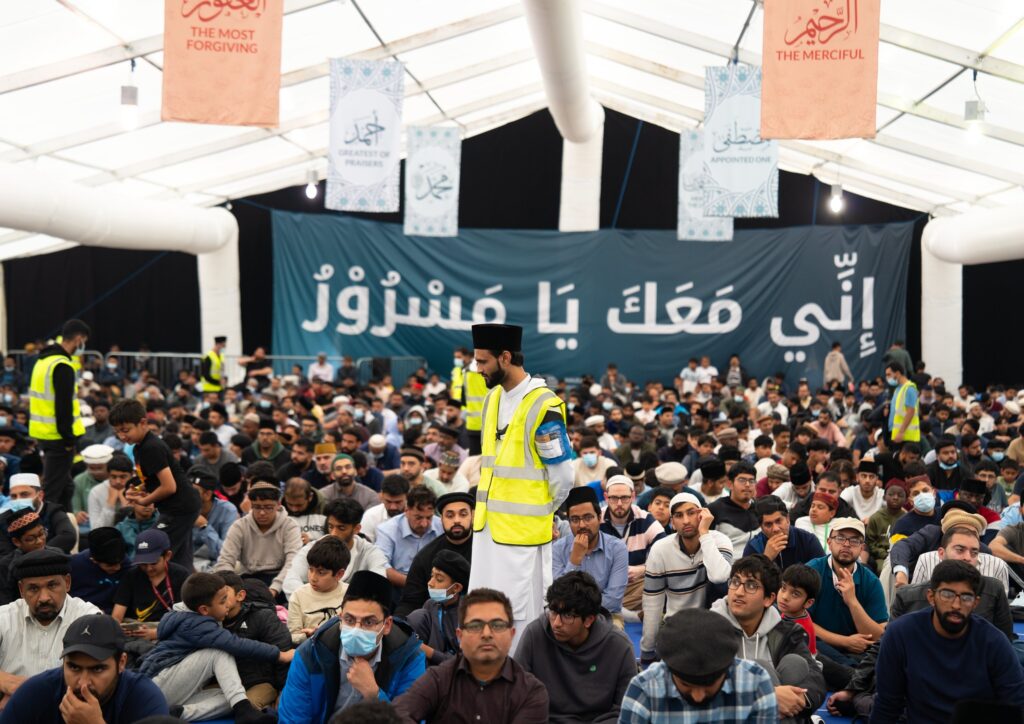Ijtema
The Path to a Spiritual & Moral Transformation

Ijtema
Our Paradise lies in our God. Understanding the Theme of the Year

For many centuries and millennia, human beings have looked to the sky. First to the moon, then to the planets, and now even to the stars. By nature, human beings are not easily content; they struggle to find satisfaction. This longing has occupied the minds of scholars and philosophers throughout history, yet many of them were never able to attain true inner peace.
Across the ages, there have been individuals who were gifted with contentment, satisfaction in their lives, they discovered inner tranquillity and recognised their true purpose. How beautifully the Promised Messiah (as) described this satisfaction when he said:
ہمارا بہشت ہمارا خدا ہے
“Our Paradise lies in our God.”
This is the theme given to Majlis Khuddamul Ahmadiyya UK for the year by Huzoor-e-Anwar (aba)—a theme especially relevant in an age marked by atheism, restlessness, materialism and uncertainty, where every person is searching for peace and fulfilment. The Promised Messiah (as) reminds us once again that:
“Our Paradise lies in our God.”
This blessed line comes from a beautiful passage in the writings of the Promised Messiah (as), in which he further states:
ہمارا بہشت ہمارا خدا ہے، ہماری اعلیٰ لذات ہمارے خدا میں ہیں کیونکہ ہم نے اس کو دیکھا اور ہر ایک خوبصورتی اس میں پائی۔ یہ دولت لینے کے لائق ہے اگرچہ جان دینے سے ملے۔ اور یہ لعل خریدنے کے لائق ہے اگرچہ تمام وجود کھونے سے حاصل ہو۔ اے محرومو! اس چشمہ کی طرف دوڑو کہ وہ تمہیں سیراب کرے گا۔ یہ زندگی کا چشمہ ہے جو تمہیں بچائے گا۔ مَیں کیا کروں اور کس طرح اس خوشخبری کو دلوں میں بٹھا دوں۔ کس دف سے مَیں بازاروں میں مُنادی کروں کہ تمہارا یہ خدا ہے تا لوگ سن لیں۔ اور کس دوا سے مَیں علاج کروں تا سننے کے لئے لوگوں کے کان کھلیں ۔
(کشتی نوح، روحانی خزائن جلد 19صفحہ 22-21)
“Our paradise lies in our God. Our highest delight is in our God for we have seen Him and found every beauty in Him. This wealth is worth procuring though one might have to lay down one’s life to procure it. This ruby is worth purchasing though one may have to lose oneself to acquire it. O ye, who are deprived! Hasten to this fountain as it will satiate you. It is this fountain of life that will save you. What am I to do? How shall I impress the hearts with this good news? What sort of a drum am I to beat in the streets in order to make the announcement that this is your God, so that people might hear?”
(Noah’s Ark pg. 34)
This powerful passage of the Promised Messiah (as) highlights the importance of remembering Allah at all times and that nothing is more important than this.
You may be reading this and thinking, how can I achieve this? Is this paradise even achievable now? Is this only possible for prophets? Dear Khuddam! Let me be the first to give you the glad tidings that the Promised Messiah (as) gave to all of us over a century ago:
‘Rejoice and be happy that the field of achieving nearness to God is vacant. Every nation is in love with the world and to what pleases God the world pays no attention. Now is the time for those who wish to enter this door that they, mustering all their strength, show their mettle and win the much coveted prize from God. Don’t think that God will let you go to waste. You are the seed which the Hand of God has sown in the earth. God says that this seed will grow and flower and its branches will spread in all directions and it will become a huge tree.’
THE HOLY QURAN
The prophets of Allah had developed such a deep connection with Allah, that they had no fear, they had found true paradise by dedicated their lives to Allah, and Allah had returned this love with divine support. This way they had found paradise in not only this world but were to receive it in the hereafter. The Holy Quran speaks about this phenomenon saying:
وَلِمَنۡ خَافَ مَقَامَ رَبِّہٖ جَنَّتٰنِ ﴿ۚ
‘For him who fears to stand before his Lord and is in awe of His Greatness and Majesty, there are two gardens [paradises], one in this world and the other in the Hereafter.’
This verse shows us that those who truly behold God Almighty in this life find the paradise that millions, no, billions, have passed away searching for. The Holy Qur’an is telling us, to seek the countenance of God Almighty in this very world, to discover a form of paradise before the next life begins. The fear of God can raise a person from complete obscurity and elevate him to the pinnacle of honour. Allah loves His servants and desires nothing except that they draw nearer to Him.
Who can forget that Allah has said:
اَلَّذِیۡنَ اٰمَنُوۡا وَتَطۡمَئِنُّ قُلُوۡبُہُمۡ بِذِکۡرِ اللّٰہِ ؕ اَلَا بِذِکۡرِ اللّٰہِ تَطۡمَئِنُّ الۡقُلُوۡبُ ﴿ؕ۲۹﴾
Those who believe, and whose hearts find comfort in the remembrance of Allah. Aye! it is in the remembrance of Allah that hearts can find comfort;
“The verse means that the believers will enjoy the blessings and favours of God in a greater measure than even that conceived by man. Happy shall be their final abode and [truly] happy indeed is he whose end is happy.”
THE HOLY PROPHET (sa)
This love of Allah and desire to be with him is exemplified in the life of the Holy Prophet (sa) , upon his return from Taif, after he had been pelted with stones and chased out of the city, after simply preaching the oneness of God he exclaimed ‘If You are not angry with me, then I do not care; but Your mercy is more expansive for me.’
On another occasion,
“The Holy Prophet (sa) used to stand (in prayer) until his feet became swollen.
He was asked, ‘Why do you do this when Allah has forgiven your past and future sins?’
He replied: ‘Should I not be a grateful servant?’”
As Ahmadi Muslims, we must strive and work towards this goal. Allah is calling out to us, inviting us to draw nearer to Him. He has assured His Prophet (sa) that when a servant takes even a small step towards God, God responds with far greater nearness; when a person approaches Him slowly, God comes towards him with love and speed. In other words, every effort we make to seek Him is met with an even greater manifestation of His grace. This is the path that leads to true closeness, and this is the paradise that begins in this very life for those who turn wholeheartedly to Allah.
This is true paradise, the state reached by prophets when they draw near to Allah. The Holy Prophet (sa) attained the very summit of this closeness during the Mi‘raj, when he experienced the highest form of spiritual vision and approached the Divine Presence at the Lote Tree.
This love of Allah is what motivated the Holy Prophet (sa), by day he would be ridiculed by opponents and by evening Allah the Almighty would comfort him. This is why upon his death he did not ask for more time or express any form of sadness but instead he said:
اللَّهُمَّ الرَّفِيقَ الأَعْلَى
‘O Allah, the Highest Companion,’
Then he passed away, showing that he had found true satisfaction in being with Allah.
THE PROMISED MESSIAH (as)
This form of love and satisfaction with their Lord is found in the lives of many prophets, the Promised Messiah (as) had great affection for Allah, he had complete and utter trust in his Lord, he had found him to be loyal and seen that with his loyalty God Almighty always came to his Aid, speaking about raising funds for publications he states:
‘I have greater trust in my Omnipotent and Magnanimous Lord than a close-fisted miser has in his coffers, whose keys are tucked away in his pocket. God, who has power over all things, will defend His Faith and His Oneness. He will come to the aid of His servant.’
How beautifully has the Promised Messiah (as) explained the love and affection of Allah, saying:
دوستی کا دم جو بھرتے تھے وہ سب دشمن ہوئے
پر نہ چھوڑا ساتھ تو نے اَے مرے حاجت برار
All those who professed friendship have turned into enemies, But You—O Fulfiller of my needs!—have never abandoned me.
اَے مرے یارِ یگانہ اَے مری جاں کی پنہ
بس ہے تو میرے لئے مجھ کو نہیں تُجھ بن بکار
O my Friend, the Unique! O Refuge of my life! You are all I need and I cannot do without You.
Here in his poetry the Promised Messiah (as) is explaining how Allah has always been with him and his life has truly become paradise for him due to his connection to Allah, describing this connection he says:
‘ Seldom does a night pass over me in which I am not given consolation [from God] that ‘I am with you and My heavenly hosts are with you.’ Although the pure of heart will behold God after death, I swear by His Countenance that I am seeing Him right now. The world does not recognize me, but the One who has sent me knows me.’
Just think for a moment: the whole world is against you. You cannot step outside your house without abuse being hurled at you. Your friends have abandoned you, your family has turned against you, yet you carry a mission, one entrusted to you by Allah. A mission greater than the need for family or friends, demanding steadfast patience. And in those moments of isolation and trial, Allah Himself comforts you every night, saying:
إِنِّي مَعَ الرَّسُولِ أَقُومُ وَ أَلُومُ مَنْ يَلُومُ وَ أُعْطِيكَ مَا يَدُومُ
I shall stand with My Messenger, and I shall rebuke the one who rebukes him and I shall bestow upon you that which shall last forever.
Hazrat Musleh Maud (ra) narrates that, the Promised Messiah (as) would receive this revelation from the moment he put his head down on his pillow to the moment he woke up. Throughout the whole night hearing:
إِنِّي مَعَ الرَّسُولِ أَقُومُ
The Promised Messiah (as) states:
“I have unearthed a gold mine and discovered a treasure trove of jewels, and by good fortune, I have discovered a lustrous and priceless diamond out of this mine. It is of such immense value that if I were to divide its worth among the whole of my brethren among humanity, each one of them would become wealthier than the per- son who owns the greatest amount of gold and silver in the world today. What is that diamond? The True God.”
KHILAFAT-E-AHMADIYYA
These states of inner paradise were not limited to earlier prophets alone; our Khulafa have also experienced them. Hazrat Musleh Maud (ra) describes how, at the age of eleven, he spent a night questioning the very existence of God. After long reflection, he writes that “I decided that God did really exist,” and in that moment “unspeakable warmth flooded my being as a child is flooded with joy when he is gathered up into the arms of his mother.” This instant of certainty, when hearsay transformed into personal experience, became for him a paradise of faith, a joy so powerful that he prayed that doubt would never again touch his heart.
Hazrat Khalifatul Masih IV (rh) similarly describes a moment of overwhelming spiritual vision. In a state “halfway between a dream and reality,” he saw the world emptied of all creation until every particle began to tremble and proclaim “OUR GOD!” The earth was “flooded with a strange light,” and he found himself repeating the same words. This experience, where every atom revealed its Creator, was a paradise of certainty, a moment in which the existence of God became not an idea, but a living, undeniable reality.
So my dear Khuddam! As the Khuddam year shifts into gear, and as you attend your local Ijtemas and other events, strive to develop this love for your Lord in your heart. Try to realise your purpose, recognise your Lord, and grow close to Him. Find Him as the light in your darkness. Ask Him for help in your everyday life. Let no waking moment pass in which your Lord is not the One you turn to for support.
I end this article with the advice Hazrat Khalifatul Masih V (aba) once gave to a young Khadim. Huzoor instructed:
اللہ تعالیٰ سے ہر معاملہ میں مدد مانگو، کسی دنیا دار کے آگے کبھی نہ جکھنا، اللہ تعالیٰ توفیق دے۔
“Seek Allah’s help in every matter of your life. Never bow before any worldly person. May Allah grant you the strength and ability to do so.”
As Allah said to the Promised Messiah (as)
جے تُو میرا ہور ہے، سب جگ تیرا ہو
If you will be devoted to Me, the whole world will be yours
As many philosophers have passed away unable to achieve this paradise, Allah has given us the opportunity, to find God, make him our paradise, our source of Joy, our source of satisfaction.
May Allah enable us to understand and better develop our Love for Allah the Almighty and to make him our paradise over any worldly object. May we be amongst the ones who understand this theme and meet the expectations of Hazrat Khalifatul Masih V (aba). Ameen
Articles
A Spiritual & Moral Transformation
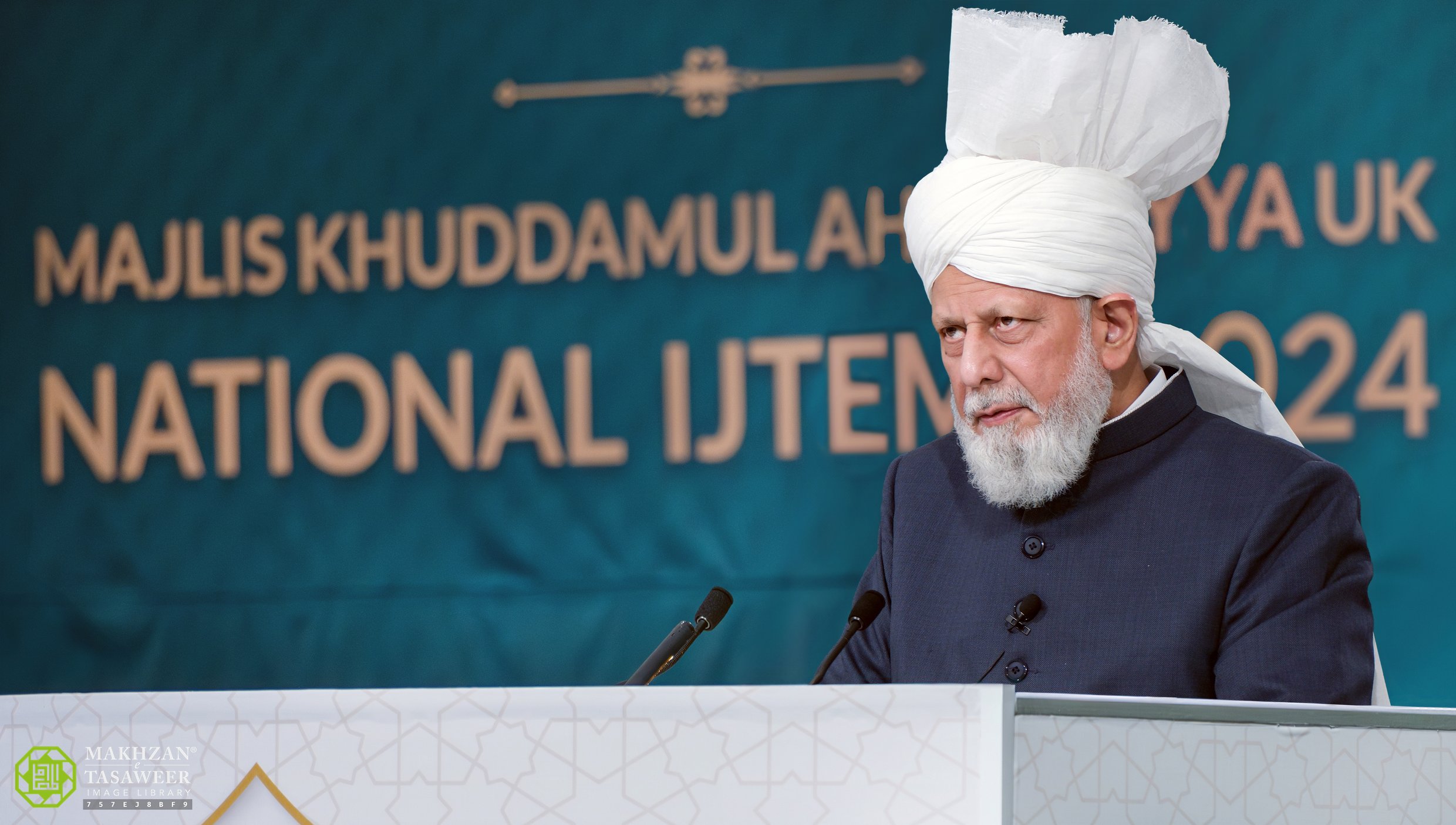
On 22nd September 2024, Hazrat Mirza Masroor Ahmad(aa) delivered the keynote address at the Ahmadiyya Muslim Youth Association’s gathering in Kingsley, Hampshire, highlighting the responsibilities on the shoulders of the attendees.
We present the official transcript of this address. After reciting Tashahhud, Ta`awwuz and Surah al-Fatihah, Hazrat Khalifatul Masih V(aa) said:
‘By the grace of Allah, once again, you have had the opportunity to hold and participate in the National Ijtema of Majlis Khuddamul Ahmadiyya, an Ijtema dedicated to young Ahmadi men and boys.
Furthermore, the Holy Prophet(sa) has stated that resorting to falsehood is a mark of a hypocrite. The Holy Prophet(sa) said that when a hypocrite speaks, he lies; when he makes a deal, he violates its terms; when he makes a promise, he breaks it; and when involved in a dispute, bereft of reason and logic, a hypocrite resorts to cursing and abusing the other party. No Ahmadi man, woman or child should ever tolerate the thought of being classed amongst the idolaters or hypocrites. As I have said, there should not even be a hint of deception in our words or deeds; rather, others should testify that Ahmadi youth speak truth, live truth and embody truth at all times. People should have complete confidence that if they deal with an Ahmadi, they will fulfil the terms of their agreement with integrity, even if it leads to a loss.
Further, if you ever find yourself in a dispute or argument, never lower your moral standards by abusing or cursing the other person; rather, use logic and evidence to support and convey your point. Hold fast to the truth, even if it may cause you short-term loss. Always remember that plotting or scheming can never lead to anything good or prove a means of benefit to us. One day, we must all depart this world, and so we must spend whatever time we have engaged in those acts that are pleasing to Allah the Almighty and abide by the perfect teaching He has bestowed to us through the Holy Prophet(sa).
Similarly, Ahmadi parents must refrain from all forms of falsehood within their homes, even what they might consider a harmless joke. As parents, you must nurture the seeds of truthfulness in your children. Otherwise, you cannot expect your children to speak truthfully and to understand its value. Similarly, always keep your promises to your children. Do not make a promise if you are unsure if you can fulfil it.
In his writings and various discourses, the Promised Messiah (as) has also repeatedly condemned falsehood in the strongest possible terms. On one occasion, the Promised Messiah (as) states, “In reality, until a person abandons falsehood, he cannot become pure. Worthless, worldly people believe that they cannot survive without lies. However, this is a reprehensible belief.”
Here, the Promised Messiah(as) condemns and utterly rejects the belief that a person must engage in falsehood to succeed. The Promised Messiah(as) further said, “If one cannot survive with truth, then falsehood certainly cannot sustain a person either. It is deeply regretful that these wretched people do not give God the value He deserves.”
He says, “They do not know that without the grace and mercy of God Almighty, a person cannot survive.”
The Promised Messiah(as) continued, “Yet, they consider the filth of falsehood to be their god and the means of resolving their difficulties. This is precisely why God Almighty has tied falsehood to idol worship in the Holy Quran. Know for certain that we cannot take even a single step, rather not even a single breath, without the grace of God.” (Malfuzat Vol. 2, p. 82)
The Promised Messiah(as) states that every single breath we take is due only to the grace of God Almighty and that a person’s scheming, plotting or lying can never lead to success. By departing from the truth, all we achieve is to depart from the protection and mercy of God Almighty. Conversely, if we eliminate falsehood from society, the many conflicts, disputes, and grievances that threaten the world’s peace and prosperity will find no oxygen to burn.
If truth and justice are prized above all else, the fear of facing the consequences of their actions would deter nations from perpetrating warfare, evil, and injustice. At an individual level, people would naturally try to free themselves of their vices out of a fear of exposure and having their reputation tarnished. This is why the Holy Prophet(sa) instructed one Companion that if he genuinely desired to rid himself of his many vices, he should pledge never again to tell a lie. Consequently, if we instil fidelity to the truth within ourselves, other virtues and qualities will automatically develop in us and become part of our daily lives.
Therefore, I reiterate that all Jama’at members, especially Khuddam and Atfal, should collectively pledge to eradicate all traces of dishonesty from their lives. Indeed, Ahmadi youth and children should, as individuals and collectively, launch a campaign and movement to uphold truthfulness and honesty, reject falsehood and embrace truth. May it be that all people testify to the fact that Ahmadi youth are those who never utter a false word.
Now, before concluding, I also wish to remind you of the crucial importance of obedience to Khilafat. If your pledge you have all vowed to abide by and fully obey any ma’ruf decision made by the Khalifah of the time, What is a ma’ruf decision? Simply, it is to convey the commands of Allah the Almighty and His noble Messenger(sa) because the Khalifah of the time will never give any instruction or statement contrary to the commands of Allah the Almighty or the Holy Prophet(sa). Accordingly, you must continually assess if you are living up to your pledge of obedience.
Amongst the ma’ruf decisions of the Khalifah of the time, instructing Ahmadis to observe Salat at the prescribed times and fulfil the rights of the worship of God Almighty is of primary importance. Thus, I repeatedly instruct Ahmadis to focus on offering namaz with concentration and humility at the appointed times. Regrettably, the attendance at our mosques and Salat centres is not as high as it should be, even though many Khuddam and Atfal live near a mosque or centre and can easily come for namaz.
Similarly, many do not wake up to offer the Fajr prayer at the correct time. Each Khadim personally, and Majlis Khuddamul Ahmadiyya as an organisation, should pay attention to this. Unquestionably, when you strive to fulfil the rights of Allah, your love for Him will naturally lead you to fulfil the rights of His creation. So, if you are diligent in the worship of Allah the Almighty, you will come to possess and exhibit the highest morals and will never be the cause of disorder or division in society. Instead, you will play a significant and positive role in bringing people together under the banner of peace, love and mutual respect.
Similarly, I wish to draw your attention to the fact that after namaz, a short dars is normally offered in our mosques, and instead of leaving quickly, you should listen carefully to them. This will ensure that the commands of Allah the Almighty and His Messenger(sa) consistently reach your ear and will deepen your understanding of Islamic teachings and beliefs.
Now, as the Ijtema draws to a close and you return to your homes, I urge you to pay close attention to what I have said today. Reflect especially upon the hadith in which the Holy Prophet(sa) taught that shunning falsehood was the means of freeing yourself from other vices and sinful activities. Similarly, pay heed to the blessed words of the Promised Messiah(as) advising his followers to remain engaged in a constant spiritual jihad against falsehood.
Always remember that a community or nation whose members manifest truth and integrity is destined for great success. Hence, if members of Majlis Khuddamul Ahmadiyya and Atfalul Ahmadiyya hold fast to truth, there is no doubt that a great and everlasting spiritual victory is destined for us. Undoubtedly, if Ahmadis manifest Islam’s true teachings, individually and collectively, then no matter what our opponents throw at us, no matter how they seek to destroy or persecute us, their every effort will be futile and denied. They will never be able to cause us any harm, as together, we will raise aloft a shield of truth that can never be penetrated, Insha’Allah.
Always remember that our purpose extends far beyond mere words. We will not fulfil our objectives just by reciting poems or slogans; rather, our prosperity lies in ensuring that our deeds perfectly mirror the teachings of Islam.
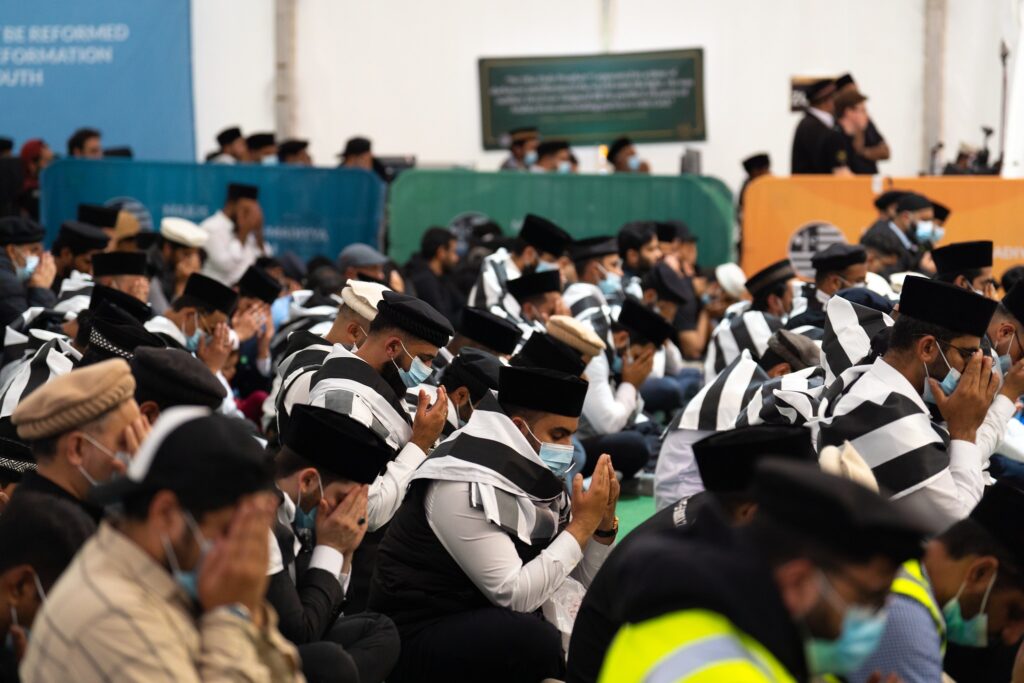
And so, at the end, I pray that may every Khadim and Tifl leave this Ijtema with a fervent and burning desire to elevate their worship, strengthen their morals and embody truth in every facet of their lives. May Allah the Almighty enable all of us to do so – Ameen. JazakAllah.
Now, join me in silent prayer.
Ijtema
Hundreds of Khuddam Gather for Local Ijtema’at Across the UK
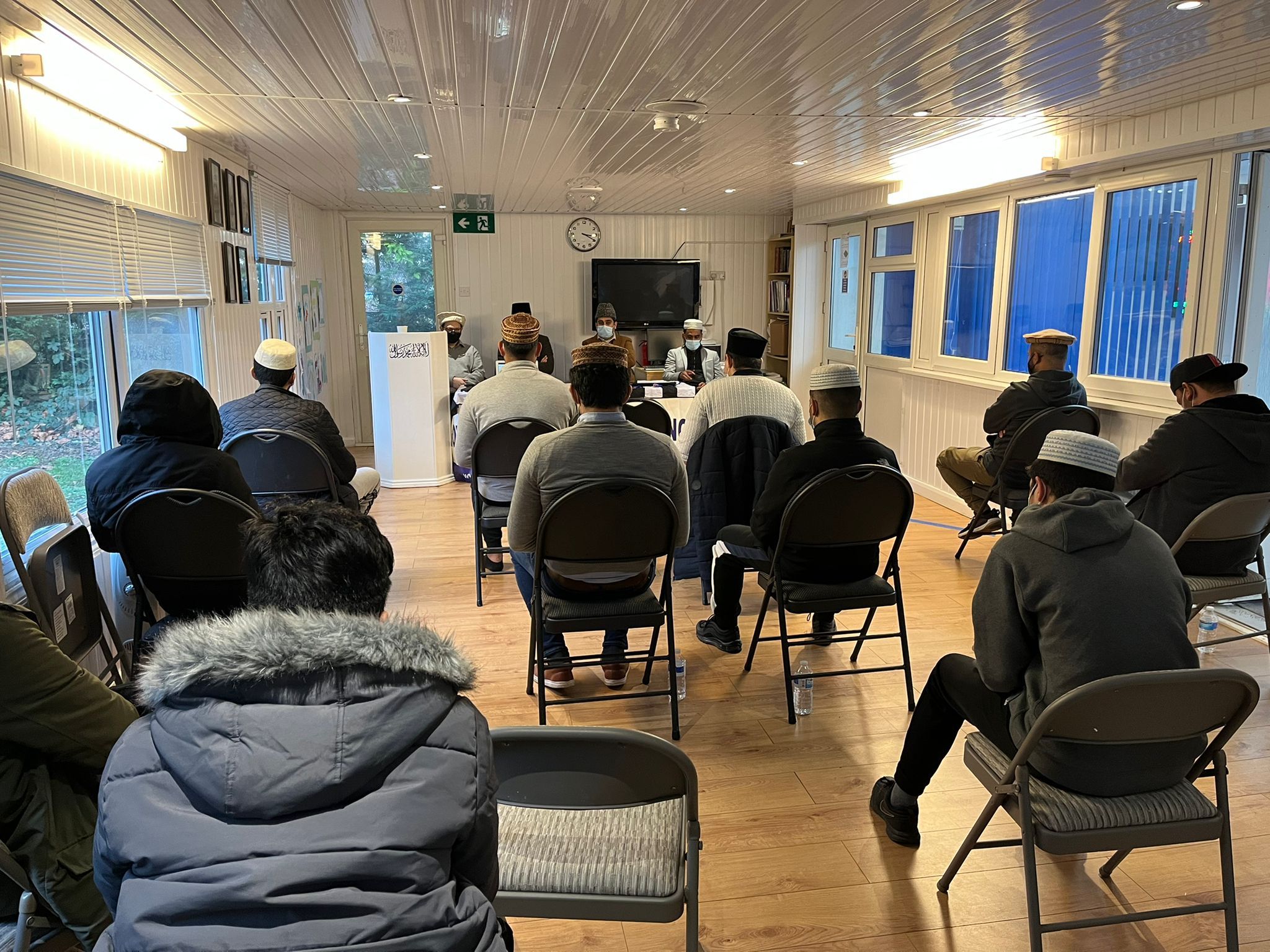
Today, on 29th January, fifteen Local Ijtema’at were held across the United Kingdom. This was the first time in almost two years that Khuddam were able to get together for an Ijtema and compete in academic and sports competitions at a local level.
The fifteen Qiadats that had their local Ijtema’at were Baitul Futuh South, Tooting Broadway, Purley, Stockport, Leamington Spa, Burton Upon Trent, Watford, Wandsworth, Guilford, Bradford South East, Mitcham Park, Peckham, Swansea, Surbiton, and Malden Manor.
The Ijtema’at followed a similar programme:
- They started with an opening session in the morning
- They then held academic competitions consisting of Tilawat, Hadith, Adhan, Speech, etc.
- Followed by Namaz Zuhr and Asr
- Sports competitions including a sprint race, football, and cricket
- Closing session around 3pm where most Qiadats were joined by Sadr Sahib Majlis Khuddamul Ahmadiyya UK via Teams and Khuddam were able to ask Sadr Sahib some questions
- The Khuddam were served food
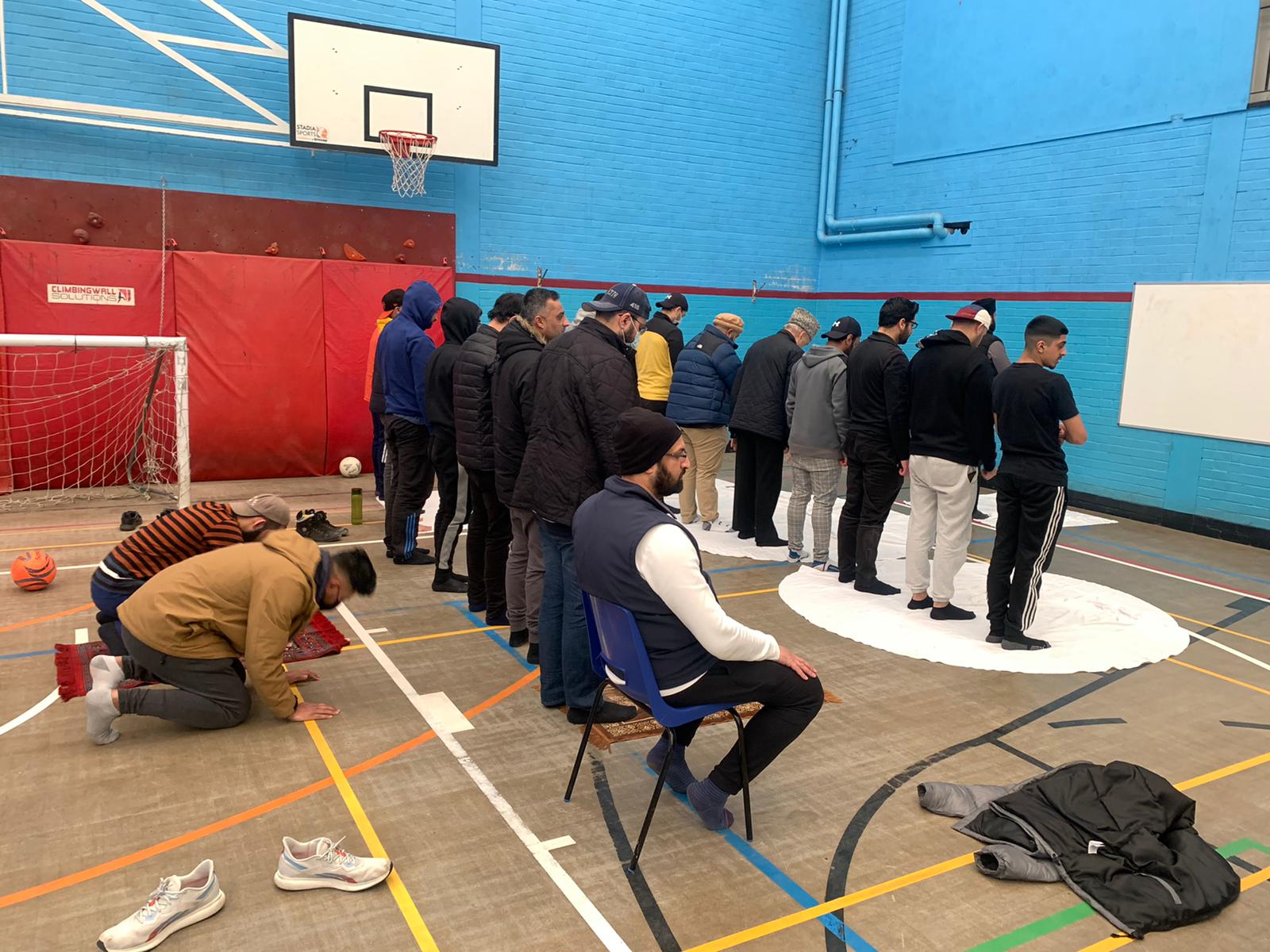
Stockport Ijtema
The feedback from all the Khuddam was positive, all were happy to be meeting their fellow Khuddam brothers once again after such a long time. Below we share some of the feedback we have received from the Qaideen about how the Khuddam found their local Ijtema:
Tayyab Ahmad, Local Qaid Watford: “Due to COVID the numbers were lower than usual but that did not stop our Ijtema from being a success. The Khuddam enjoyed each other’s company and there is a strong feeling of being part of something that is bigger than all of us — overall everyone enjoyed participating in the sports and academic competitions.”
Fadlullah Afolabi, Local Qaid Peckham: “Alhamdulillah the Ijtema was successful, we managed to do football which always gets Khuddam together. Khuddam understood the theme for the year and Sadr Sahib’s address was very useful to everyone.”
Ammar Ahmad, Regional Qaid Darul Aman, speaking in relation to the Stockport Ijtema said “This is the first local Itema in over two years. One Khadim who unfortunately had to miss out still stood around outside for a bit, dismayed. He said he wishes he could be part of the gathering. We had our regional Murabbi Sahib do a Talqeen-e-Amal which was very beneficial to Khuddam, but it was the gathering of Khuddam— learning together, doing sports together, and doing prayers together which everyone loved.”

Watford Ijtema
At 3pm, the majority of the local Ijtema’at tuned into a live session with Sadr Sahib UK which he chaired from the Guildford Ijtema. Sadr Sahib delivered a talk that was listened to by all Khuddam present both physically and virtually as part of the closing sessions, due to all Ijtema’at having a hybrid set-up. At the end of the talk, Sadr Sahib opened up the floor for questions. These, along with the answers, are presented below.
Question: Why are congregational prayers more rewarding that individual prayers?
Answer: “In Islam there is more reward engaging in acts of virtue and goodness collectively. The reason for this is that through congregational efforts everyone influences each other and naturally the good in society is absorbed. Therefore, Islam has prescribed congregational prayers for all men and emphasised that it is obligatory upon men to pray at a Mosque. When we convene in gatherings such as today’s Ijtema’at and offer our prayers together, it has a different spiritual effect as compared to praying at home.”
Question: To what extent do we compromise shaking hands with the opposite gender?
Answer: “In reality you do not need to compromise on this. You should explain that these are your values and your religious beliefs and that they should be respected in the same way that you respect the values of others in society. We should remember that Allah the Almighty has a way of making mankind accept His commands—with the pandemic everyone has been forced to cover-up which is a type of Purdah [Islamic veil], before women in the West would not cover their faces but now at the very least they have to cover their faces in line with government guidelines. Furthermore, most people today prefer not shaking hands and prefer just saying greetings to each other from a distance because of COVID. Therefore, there is nothing wrong if you explain that you are not shaking hands because of your values. You should be polite, but be courageous about it.”
Question: These days the Jama’at is going through some difficulty, how can we show Huzooraba that we are loyal and how can we help him?
Answer: “Allah the Almighty has said when someone says he or she believes it is not the end of their difficulty. Rather, Allah the Almighty will test that belief in various ways. This is also the case with the community of believers. It is through such trials that Allah the Almighty determines who is a loyal devotee and whose faith is empty. Therefore, our responsibility is to act upon the instructions of Hazrat Khalifatul-Masih Vaba and to ensure that we remain attached to the Jama’at. In the future our progeny will either thank Allah that their forefathers remained attached to Khilafat if we now remain devoted, or they will curse those who left the Jama’at.”
-

 Ijtema2 months ago
Ijtema2 months agoOur Paradise lies in our God. Understanding the Theme of the Year
-

 News1 month ago
News1 month agoA Fresh Start: Serving God and Community in the New Year
-

 News2 months ago
News2 months agoCalling to the Way of Allah with wisdom – MKA West Midlands Tabligh Waqf-e-Arzi
-

 Editorial4 weeks ago
Editorial4 weeks agoCondition 2 of Bai‘at
-

 Editorial1 month ago
Editorial1 month agoConditions of Bai’at: Condition 1, abstaining from Shirk
-

 Editorial3 weeks ago
Editorial3 weeks agoCondition 3 of Bai‘at: Offering Prayers & Durood
-

 Editorial1 hour ago
Editorial1 hour agoConditions of Bai’at: Condition 4, cause no harm

